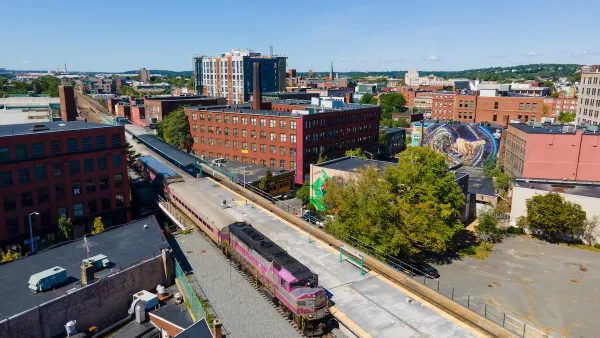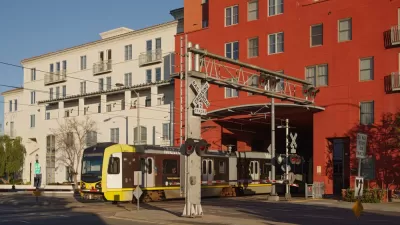The ‘Work, Live, Ride’ bill would prioritize funding for designated transit-oriented zones to encourage denser development near transit.

A bill that would encourage more transit-oriented development is back before the Connecticut State Assembly, reports Sam Hilton in Connecticut Mirror.
Dubbed Work, Live, Ride by the housing advocacy group DesegregateCT, this measure would prioritize communities with qualifying transit-oriented districts when doling out discretionary infrastructure funding or grants such as the Small Town Economic Assistance Program (STEAP) or the Urban Act Grant Program, both of which help municipalities invest in economic revitalization.
The law defines transit-oriented districts as “an area within a half-mile radius of a train or bus station that a city or town has designated for mixed-use and more dense development.” The zones would permit middle housing such as duplexes as well as higher-density multifamily housing.
Notably, this new version of the bill allows “transit-adjacent” communities without their own transit stations to create their own transit-oriented districts as well. The updated bill would create a public water and sewer rehabilitation or expansion account to assist communities with improving their infrastructure to accommodate new development.
Opponents say the law could force cities into zoning changes without community input. Hilton notes that the bill doesn’t force cities to create transit-oriented districts, but “specifies that a city must ask the secretary to designate such an area as qualifying for priority funding at a state level, and that areas that are already sufficiently dense can be grandfathered in at the town’s request, but don’t have to be.”
FULL STORY: ‘Work Live Ride’ is back on the legislature’s docket. Here’s what to know

Planetizen Federal Action Tracker
A weekly monitor of how Trump’s orders and actions are impacting planners and planning in America.

Maui's Vacation Rental Debate Turns Ugly
Verbal attacks, misinformation campaigns and fistfights plague a high-stakes debate to convert thousands of vacation rentals into long-term housing.

Restaurant Patios Were a Pandemic Win — Why Were They so Hard to Keep?
Social distancing requirements and changes in travel patterns prompted cities to pilot new uses for street and sidewalk space. Then it got complicated.

Charlottesville Temporarily Has No Zoning Code
A judge ordered the Virginia city to throw out its newly revised zoning code, leaving permitting for new development in legal limbo.

In California Battle of Housing vs. Environment, Housing Just Won
A new state law significantly limits the power of CEQA, an environmental review law that served as a powerful tool for blocking new development.

Boulder Eliminates Parking Minimums Citywide
Officials estimate the cost of building a single underground parking space at up to $100,000.
Urban Design for Planners 1: Software Tools
This six-course series explores essential urban design concepts using open source software and equips planners with the tools they need to participate fully in the urban design process.
Planning for Universal Design
Learn the tools for implementing Universal Design in planning regulations.
Heyer Gruel & Associates PA
JM Goldson LLC
Custer County Colorado
City of Camden Redevelopment Agency
City of Astoria
Transportation Research & Education Center (TREC) at Portland State University
Jefferson Parish Government
Camden Redevelopment Agency
City of Claremont





























